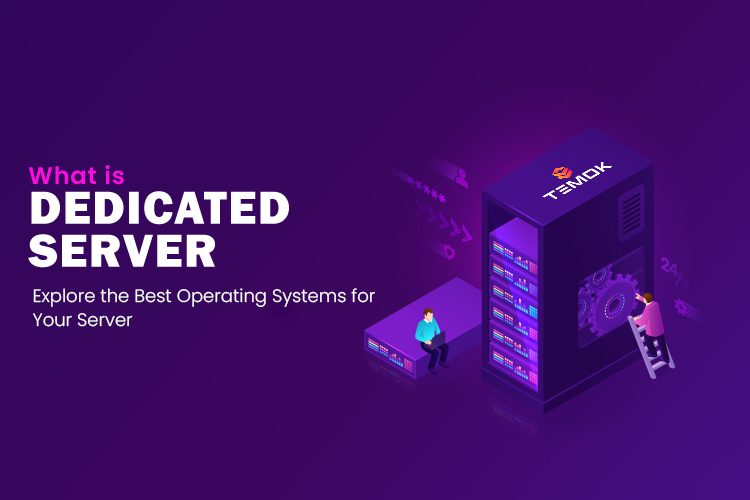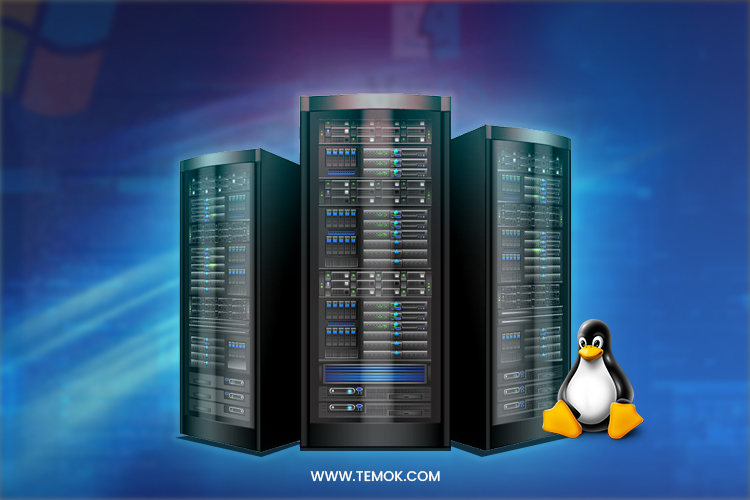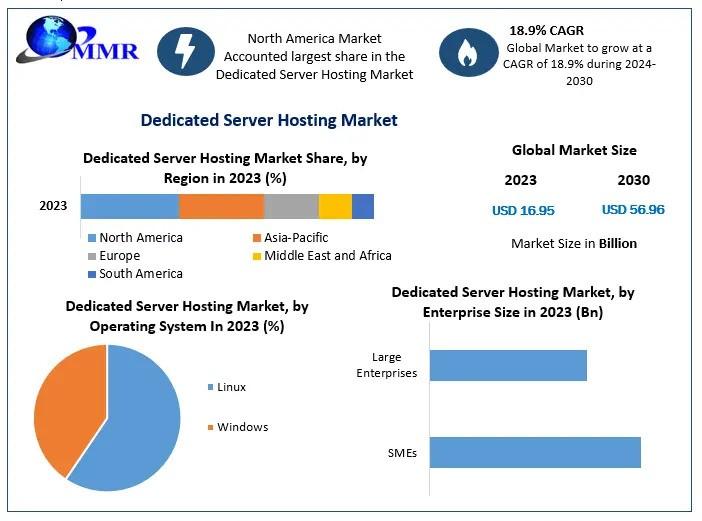
An operating system, abbreviated OS, powers every computer you use. Consequently, your dedicated server would require one as well. Moreover, the operating system you select for your dedicated server will significantly impact your experience. Before investing in a dedicated server, its operating system should take precedence over its other features. What is dedicated server? A server operating system is a crucial component of any network or data center, serving as the foundation for the execution of applications and services. A rise in cloud computing and digital operations has increased demand for server operating systems.
A dedicated server’s operating system is only relevant if you or an employee will be working directly with it. Your operating system could be more relevant if you intend to pay the hosting company for administrative support.
What is Dedicated Server?
As the name indicates, a dedicated server is a form of server that provides complete access to the hardware that you are paying for. You cannot share server resources with other organizations.
A dedicated server, often called a bare-metal server, is a specific physical server that only serves the needs of one hosting client at a time.
Therefore, if you put your website on a dedicated server, your website will have access to all the server’s resources. There will be no need to pool server resources like memory, processing power, or storage space with other organizations. If your company’s success relies on your website or an online application, you should invest in a dedicated server.
Dedicated server hosting is widely regarded as the best web hosting service due to its numerous advantages. When you acquire dedicated hosting, your website is hosted on its server. It provides stable flexibility and power but is more expensive than other alternatives. Therefore, you should ensure you require more power and control before pursuing it. Dedicated servers offer superior performance, making them a top choice for popular sites that overcome the limitations of shared hosting. Its common practice for website owners to begin with shared hosting and progress to VPS or dedicated as their needs evolve.
A dedicated server should be considered if you require a fully customizable solution. It provides the highest level of raw performance, making it ideal for demanding computing or storage requirements. A dedicated server allows handle massive projects, unlike standard web hosting packages, designed for websites. For instance, you can use your dedicated servers to construct a custom infrastructure or add a virtualization layer to create a fleet of virtual machines. As a result, dedicated servers are suitable for all use cases due to their limitless capabilities.
Difference Between a Dedicated Server & Shared Server
There are so many options available regarding web hosting services that you may need help knowing where to begin. Using a shared or dedicated server is two of the most common options. Each server type has advantages and disadvantages, making it appropriate for achieving particular business goals.
Shared and dedicated hosting stores your website’s data on a single server. This server transmits your data to users accessing your website via a web browser. The hosting services vary based on the type of server your website is hosted on. When you go with shared hosting, multiple websites from different users share the same server.
Shared Hosting

This is one of the inexpensive web hosting services that is an excellent choice for entrepreneurs. In shared hosting services, multiple websites are hosted on a single server. Additionally, all server resources are shared between websites. In this way, the cost of the server can be shared evenly between all domain managers. For those with little website experience, shared hosting is a great solution. It’s a way for multiple websites to share the power of a single server. Many websites must be aware of other sites hosted on the same server. Regardless of their plan, all locations share the same server resources.
Shared hosting allows numerous websites to share the resources of a single server. Some have likened the low cost and resource-sharing nature of shared hosting to taking the bus. Hosting hundreds or thousands of websites on one server has pros and cons.
While with dedicated web hosting, your website has its server. Dedicated hosting means that an entire server is dedicated to hosting only your website.
Additionally, a dedicated hosting solution may be your best option if your website often receives thousands of visitors at once. If you want your website visitors to always get a quick response, you need a robust server devoted to your site. It provides complete control over the server’s operating system, database, and other details, ensuring that your websites always function as desired. So the question of what is a dedicated server would be understood now.
Moreover, explaining official dedicated and local server differences can be answered as an individual or organization owns and controls a local server for private usage. In contrast, a firm or organization owns and manages an official dedicated server for public access.
VPS Hosting

The term “virtual private server” (VPS) refers to a type of virtual server that employs virtualization technology to give other virtual servers access to the parent server’s dedicated (private) resources. A server is a high-powered computer where your website’s information and files are kept safe and accessible. When a visitor enters your domain name and opens your website in their browser, a powerful computer serves it up.
VPS uses virtualization technologies to partition that single robust server into several smaller “virtual” servers. Consider it as a single piece of hardware that performs the duties of numerous servers.
Medium-traffic websites benefit from the stability and security of dedicated servers. Here, you will receive all services, including a website hosted on a dedicated server, at a lower price. A dedicated server ensures that traffic spikes or issues on other websites will not affect operations.
VPS servers are more likely to guarantee a high-performance website than shared hosting, even if many individuals consider starting with shared hosting and moving to VPS when website traffic increases. Websites that deal with private or sensitive information, like online stores, benefit significantly from VPS hosting.
Working with VPS hosting requires some technical knowledge. Your website will have its dedicated processing unit (CPU) and memory (RAM) in this hosting. In a nutshell, virtual private server hosting can save you money.
Cloud Hosting

Cloud hosting is a term that has emerged recently in the IT sector. Regarding web hosting, the cloud refers to a network of computers executing applications using mutual computing resources. It is a network-based hosting solution that enables a business to utilize the computing resource. Cloud-based hosting allows for the management of higher website traffic.
This allows users to utilize numerous resources based on their requirements without building or maintaining their computing infrastructure. Using multiple servers to distribute computational resources reduces the likelihood of downtime caused by a server malfunction. The fact that cloud hosting is scalable means that your website can expand over time, utilizing resources as needed, while the website owner only pays for the resources he needs.
By using cloud hosting, a company can have a third party handle the servers and data storage for its website. The cloud services network, both virtual and physical, can handle the computing and data storage needs of a company’s website.
Compared to Dedicated Hosting, which is more expensive and requires more technical know-how, cloud hosting is more cost-effective and user-friendly. Scalability is another advantage of cloud hosting. When traffic increases, you can add more servers and lower them when it decreases.
Explore the Best Operating Systems for Your Server
An OS for servers is essential because it provides the backbone for other components, such as applications and services, to be built. The necessity for server operating system software has increased with the popularity of cloud computing and other digital operations.
Businesses must make informed decisions. Limiting the top server OS candidates to one that meets an individual’s or business’s specific demands can take time and effort.
An operating system is the connection between computer hardware and the programs that operate on it. For instance, an operating system analyzes the resources a piece of software requires and determines how best to make those resources accessible from the server. In addition to interpreting commands and initiating server actions accordingly, an OS manages files and data storage.
Therefore, the OS is crucial to your dedicated server’s configuration. Your hosting provider or IT department may install an operating system. In contrast to IaaS and PaaS cloud services, a dedicated server does not come pre-installed with an operating system.
Moreover, Windows and Linux are the two most common operating system options when discussing OS for a dedicated server. Linux has dozens of distributions, each with its own benefits. Choosing the correct operating system for your business requires evaluating the relative strengths of the available options and comparing them to the requirements of your IT operations.
Recommended article: Top Operating Systems to Fulfill Your Business and Personal Needs
Windows Servers

For the past three decades, Windows has dominated the operating system market. Windows operates on an estimated 1.5 billion devices worldwide and controls 91% of the global desktop market.
Significant differences exist between operating a PC and an enterprise-scale IT system on a dedicated server. Despite its desktop dominance, Windows shines on dedicated servers due to the comfort of its familiar interface. Most of us are familiar with the graphical user interface and set of navigational tools that Windows provides on personal computers, and those are available to you on your hosted server if you want to install Windows.
If you need a developer-heavy IT team but still want to configure your server resources, Windows is a good solution. Windows server has a remote desktop interface with icons and menus, while Linux uses command line operations and syntax.
Microsoft provides specialized support for Windows servers, which is another reason to choose this platform. Linux is a decentralized, open-source product, so you must know where to seek assistance. If your business significantly relies on Windows software products, a Windows server is a natural choice as it offers natural and straightforward integration.
Linux Servers

If the topic is the finest server operating system, Linux is unquestionably in the lead. People widely regard Linux, based on UNIX, as one of the finest operating systems with web server capabilities for small computers. Linux, a 1991 server operating system, is popular with developers and coders as one of the finest server operating system options.
Linux’s acceptance by hosting providers is a testament to the operating system’s versatility. Linux offers more freedom and control than a Windows server, but its use requires more technical competence.
As a ‘developer’s operating system,’ it permits complete customization, allowing business users to configure their server resources to meet the precise requirements of their operations. The best OS for dedicated game servers enables modifications in-game without requiring a system reboot — something Windows does not permit. Here is a synopsis of four of the most popular Linux distributions.
Ubuntu
Ubuntu is a widely used Linux distribution due to its simplicity in a dedicated server environment. It is the operating system for several significant IT companies, including IBM, HP Cloud, and even Microsoft.
Ubuntu is built to make customization and scalability of services as simple as possible inside a Linux environment, in addition to the traditional Linux benefits of being very cost-effective and efficient. One suitable for established businesses and startups with big expansion plans.
Also read: Should I Go With Linux or Windows Hosting For Business?
Red Hat Enterprise Linux
In contrast to free Linux variants, Red Hat Enterprise Linux requires a license fee and a monthly subscription. The company markets its Linux distribution as a service for large corporations that want to make the most of cloud computing by providing dedicated technical support, frequent stable release cycles, and tight security measures.
Users also get a broad software library and development toolset to sweeten the membership costs. Ideal for firms that desire Linux flexibility and control with Windows support.
CentOS
CentOS is a free and open-source distribution based on Red Hat Enterprise Linux. It shares all of RHEL’s main characteristics. The perception is that CentOS is less feature-rich than other Linux distributions, most likely because you need access to the Red Hat developer tools and software that come with the paid version. One is for organizations that value dependability and security more than tools and features.
Debian
Debian’s flexibility in configuration and customization and its community support, security, and stability make it the preferred distribution among Linux loyalists.
Moreover, Debian reliable mechanism ensures that you’re always using the most up-to-date OS owing to the reliable update mechanism to regularly add new functionality, remove bugs, and counter security threats. Installation requires technical expertise because you tell your operating system to do precisely what you want. One for development professionals who want to get the most out of their operating system.
Conclusion: What is Dedicated Server: Explore the Best Operating Systems for Your Server
When selecting an operating system for your dedicated server, stay with what you know is best; Mastering Linux command line operation for server support is difficult for most individuals. You will enjoy greater efficiency, reliability, and a positive reputation if you know Linux. Online resources are also accessible to help you fix issues.
If you need a dedicated server quickly, learning a new operating system may not be viable, but it can be advantageous to be familiar with Linux.
Overall, there are numerous options, making this a difficult choice. Consider what suits your business, the level of support you desire, and the technical skills you already possess. At Temok, our professionals can assist you in evaluating your options carefully.
If you have any further inquiries regarding Temok, please do not hesitate to contact us.
https://www.temok.com/blog/what-is-dedicated-server/






